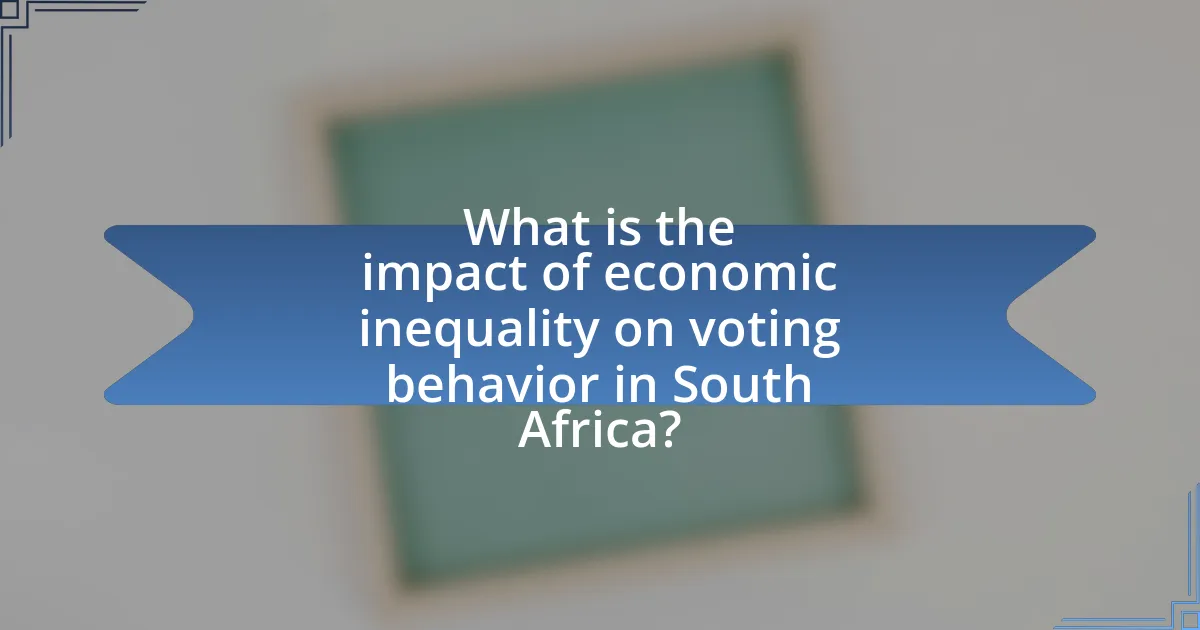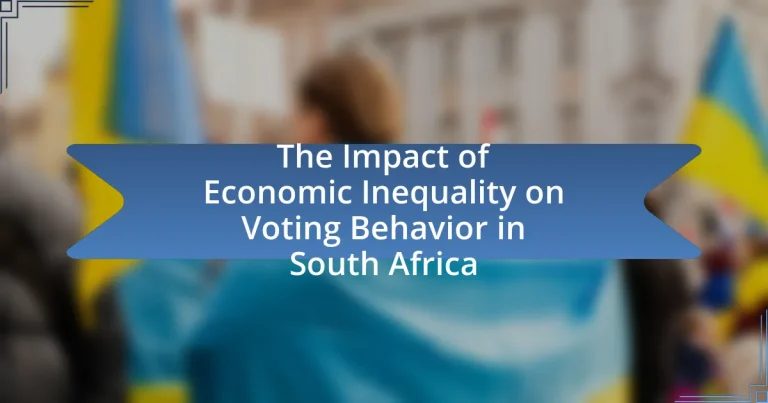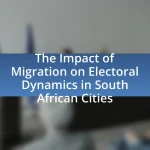The article examines the impact of economic inequality on voting behavior in South Africa, highlighting how disparities in wealth influence political preferences, voter turnout, and party affiliation among different socioeconomic groups. It discusses the barriers faced by lower-income individuals that hinder their electoral participation, such as lack of access to resources and feelings of disenfranchisement. Additionally, the article explores how demographic factors, economic status, and perceptions of political candidates shape voting patterns, ultimately affecting policy outcomes and governance. The analysis underscores the need for targeted voter engagement strategies and initiatives to address the concerns of economically disadvantaged populations, aiming to enhance their participation in the democratic process.

What is the impact of economic inequality on voting behavior in South Africa?
Economic inequality significantly influences voting behavior in South Africa by shaping political preferences and participation levels among different socioeconomic groups. Research indicates that individuals from lower-income backgrounds often feel disenfranchised and may abstain from voting due to a lack of trust in the political system, while wealthier citizens are more likely to engage in the electoral process and support parties that align with their interests. For instance, a study by the Institute for Justice and Reconciliation found that economic disparities correlate with varying levels of political engagement, where the affluent are more likely to vote and influence policy outcomes, thereby perpetuating the cycle of inequality.
How does economic inequality influence voter turnout in South Africa?
Economic inequality significantly influences voter turnout in South Africa by creating disparities in political engagement among different socioeconomic groups. Research indicates that individuals from lower-income backgrounds often face barriers such as lack of access to information, transportation, and resources, which diminishes their likelihood of participating in elections. For instance, a study by the Electoral Commission of South Africa found that voter turnout was markedly lower in economically disadvantaged areas compared to wealthier regions, highlighting the correlation between income levels and electoral participation. Additionally, economic inequality fosters feelings of disenfranchisement and apathy towards the political system, further reducing turnout among those affected.
What demographic factors contribute to variations in voter turnout related to economic inequality?
Demographic factors that contribute to variations in voter turnout related to economic inequality include age, education level, income, and race. Younger individuals often exhibit lower turnout rates, while older voters tend to participate more consistently. Education significantly influences turnout; those with higher educational attainment are more likely to vote, as they often have better access to information and resources. Income disparities also play a crucial role, with lower-income individuals facing barriers that hinder their participation, such as transportation issues and time constraints. Additionally, racial dynamics in South Africa show that historically marginalized groups may experience systemic obstacles that affect their voting engagement, leading to lower turnout rates compared to more affluent demographics. These factors collectively illustrate how economic inequality intersects with demographic characteristics to shape voter participation in South Africa.
How does economic status affect the likelihood of participation in elections?
Economic status significantly affects the likelihood of participation in elections, with individuals from higher economic backgrounds more likely to vote than those from lower economic backgrounds. Research indicates that wealthier individuals often have greater access to resources such as education, information, and transportation, which facilitate voting. For instance, a study by the Electoral Commission of South Africa found that in the 2019 elections, voter turnout was highest among individuals in the highest income brackets, with a turnout rate of 66%, compared to only 40% among those in the lowest income brackets. This disparity highlights how economic status directly influences electoral participation, as financial constraints can limit access to voting opportunities and civic engagement.
What role does economic inequality play in shaping political preferences?
Economic inequality significantly influences political preferences by creating divergent interests among different socioeconomic groups. Individuals in lower-income brackets often prioritize policies that promote social welfare and economic redistribution, while those in higher-income brackets may favor tax cuts and deregulation. Research indicates that in South Africa, economic disparities have led to distinct voting patterns, with wealthier citizens more likely to support parties advocating for neoliberal economic policies, while poorer citizens tend to align with parties that promise social justice and economic equity. For instance, the 2019 national elections revealed that the African National Congress (ANC) garnered substantial support from lower-income voters, reflecting their preference for policies aimed at reducing inequality.
How do economic disparities affect party affiliation among voters?
Economic disparities significantly influence party affiliation among voters in South Africa. Voters from lower economic backgrounds tend to align with parties that advocate for social welfare and economic redistribution, such as the African National Congress (ANC) and the Economic Freedom Fighters (EFF). In contrast, wealthier voters often support parties that promote free-market policies and economic liberalization, like the Democratic Alliance (DA). Research indicates that in the 2019 national elections, 56% of voters with a monthly income below R3,500 supported the ANC, while only 15% of those earning above R20,000 did the same. This trend illustrates how economic status shapes political preferences, reinforcing the divide in party affiliation based on economic inequality.
What issues are prioritized by voters from different economic backgrounds?
Voters from different economic backgrounds prioritize distinct issues, with lower-income voters often focusing on basic needs such as employment, housing, and social welfare, while higher-income voters tend to prioritize economic growth, tax policies, and education. Research indicates that in South Africa, for instance, a study by the Institute for Justice and Reconciliation found that 62% of low-income voters identified job creation as their top concern, whereas 55% of high-income voters emphasized the importance of economic stability and investment opportunities. This divergence in priorities reflects the varying impacts of economic conditions on the concerns of different voter demographics.
How does economic inequality impact the perception of political candidates?
Economic inequality significantly influences the perception of political candidates by shaping voters’ trust and expectations. In contexts where economic disparities are pronounced, candidates perceived as empathetic to the struggles of lower-income constituents tend to garner more support. For instance, research indicates that in South Africa, candidates who advocate for policies addressing economic inequality are often viewed more favorably by voters from disadvantaged backgrounds. A study by the Institute for Justice and Reconciliation found that economic inequality correlates with political disillusionment, leading voters to favor candidates who promise systemic change. This dynamic illustrates how economic conditions directly affect political perceptions and electoral outcomes.
What characteristics do economically disadvantaged voters seek in candidates?
Economically disadvantaged voters seek candidates who demonstrate empathy, integrity, and a commitment to social justice. These voters prioritize candidates who understand their struggles and advocate for policies that address economic inequality, such as job creation, affordable housing, and accessible healthcare. Research indicates that candidates who actively engage with marginalized communities and propose concrete solutions to economic challenges resonate more with these voters. For instance, a study by the Institute for Justice and Reconciliation highlights that economically disadvantaged individuals are more likely to support candidates who prioritize economic reforms and social equity initiatives.
How does economic inequality influence trust in political institutions?
Economic inequality significantly undermines trust in political institutions by fostering perceptions of unfairness and exclusion among disadvantaged groups. When wealth is concentrated in the hands of a few, those with lower economic status often feel marginalized and believe that political institutions serve the interests of the wealthy rather than the general populace. Research indicates that in South Africa, high levels of economic inequality correlate with decreased trust in government and political leaders, as evidenced by surveys showing that citizens from lower-income brackets express skepticism about the effectiveness and integrity of political institutions. This erosion of trust can lead to lower voter turnout and increased political apathy, further entrenching the cycle of inequality and disillusionment.
What are the broader implications of economic inequality on democratic processes in South Africa?
Economic inequality significantly undermines democratic processes in South Africa by creating disparities in political participation and representation. Wealthier individuals often have greater access to political resources, influencing policy decisions and electoral outcomes, while marginalized communities face barriers that limit their engagement in the democratic process. For instance, the 2021 South African Human Sciences Research Council report highlighted that individuals from lower-income backgrounds are less likely to vote, which skews representation in government. This unequal participation can lead to policies that favor the affluent, perpetuating a cycle of inequality and disenfranchisement. Furthermore, economic inequality fosters social unrest and distrust in democratic institutions, as seen in various protests against perceived government inaction on economic issues, thereby threatening the stability and legitimacy of the democratic system.
How does economic inequality affect policy outcomes and governance?
Economic inequality significantly influences policy outcomes and governance by skewing political power towards wealthier individuals and groups. This concentration of power often leads to the prioritization of policies that favor the interests of the affluent, such as tax cuts for high-income earners or reduced regulations on businesses, while neglecting the needs of lower-income populations. Research indicates that in South Africa, economic disparities have resulted in governance that reflects the preferences of the wealthy, as evidenced by the disproportionate lobbying efforts and political contributions from affluent sectors. Consequently, this dynamic undermines democratic processes and exacerbates social divisions, as policies may fail to address critical issues like poverty alleviation and equitable access to resources.
What are the long-term effects of economic inequality on political stability?
Economic inequality significantly undermines political stability by fostering social unrest and eroding trust in institutions. Over time, disparities in wealth and income can lead to increased polarization among different socioeconomic groups, resulting in heightened tensions and potential conflict. For instance, research indicates that countries with high levels of economic inequality experience more frequent protests and civil disturbances, as marginalized populations feel excluded from political processes and economic opportunities. Additionally, economic inequality can weaken democratic institutions, as wealthier individuals and corporations gain disproportionate influence over political decision-making, leading to policies that favor their interests over those of the broader population. This dynamic can create a cycle of disenfranchisement, further destabilizing the political landscape.
How can understanding the impact of economic inequality improve voter engagement strategies?
Understanding the impact of economic inequality can significantly enhance voter engagement strategies by tailoring outreach efforts to address the specific concerns of economically disadvantaged populations. Research indicates that economic inequality often leads to lower voter turnout among marginalized groups, as they may feel disenfranchised or believe their votes carry less weight. For instance, a study by the Electoral Commission of South Africa found that individuals in lower income brackets are less likely to participate in elections compared to their wealthier counterparts. By recognizing these disparities, voter engagement strategies can be designed to include targeted messaging, community outreach programs, and accessible voting resources that resonate with the unique experiences and challenges faced by these groups. This approach not only fosters a sense of inclusion but also empowers individuals to participate in the democratic process, ultimately leading to a more representative electorate.
What initiatives can be implemented to increase voter participation among economically disadvantaged groups?
To increase voter participation among economically disadvantaged groups in South Africa, initiatives such as targeted voter education campaigns, accessible polling locations, and financial assistance for transportation can be implemented. Targeted voter education campaigns can inform these groups about the voting process, their rights, and the importance of their participation, as evidenced by studies showing that informed voters are more likely to engage in elections. Accessible polling locations, including mobile voting units, can reduce barriers to access, as research indicates that proximity to polling places significantly affects turnout rates. Additionally, providing financial assistance for transportation can alleviate the cost burden associated with traveling to polling stations, which is a significant barrier for economically disadvantaged individuals. These initiatives collectively address the systemic obstacles faced by these groups, thereby enhancing their participation in the electoral process.
How can political parties better address the concerns of voters affected by economic inequality?
Political parties can better address the concerns of voters affected by economic inequality by implementing targeted economic policies that directly alleviate poverty and promote equitable growth. For instance, parties can advocate for progressive taxation, which has been shown to reduce income disparity, as evidenced by the OECD’s findings that countries with higher tax rates on the wealthy experience lower levels of inequality. Additionally, political parties should prioritize social safety nets and job creation programs, as research from the World Bank indicates that such initiatives can significantly improve the living standards of low-income households. By actively engaging with affected communities and incorporating their feedback into policy-making, parties can ensure that their strategies are relevant and effective in addressing the specific needs of voters impacted by economic inequality.


